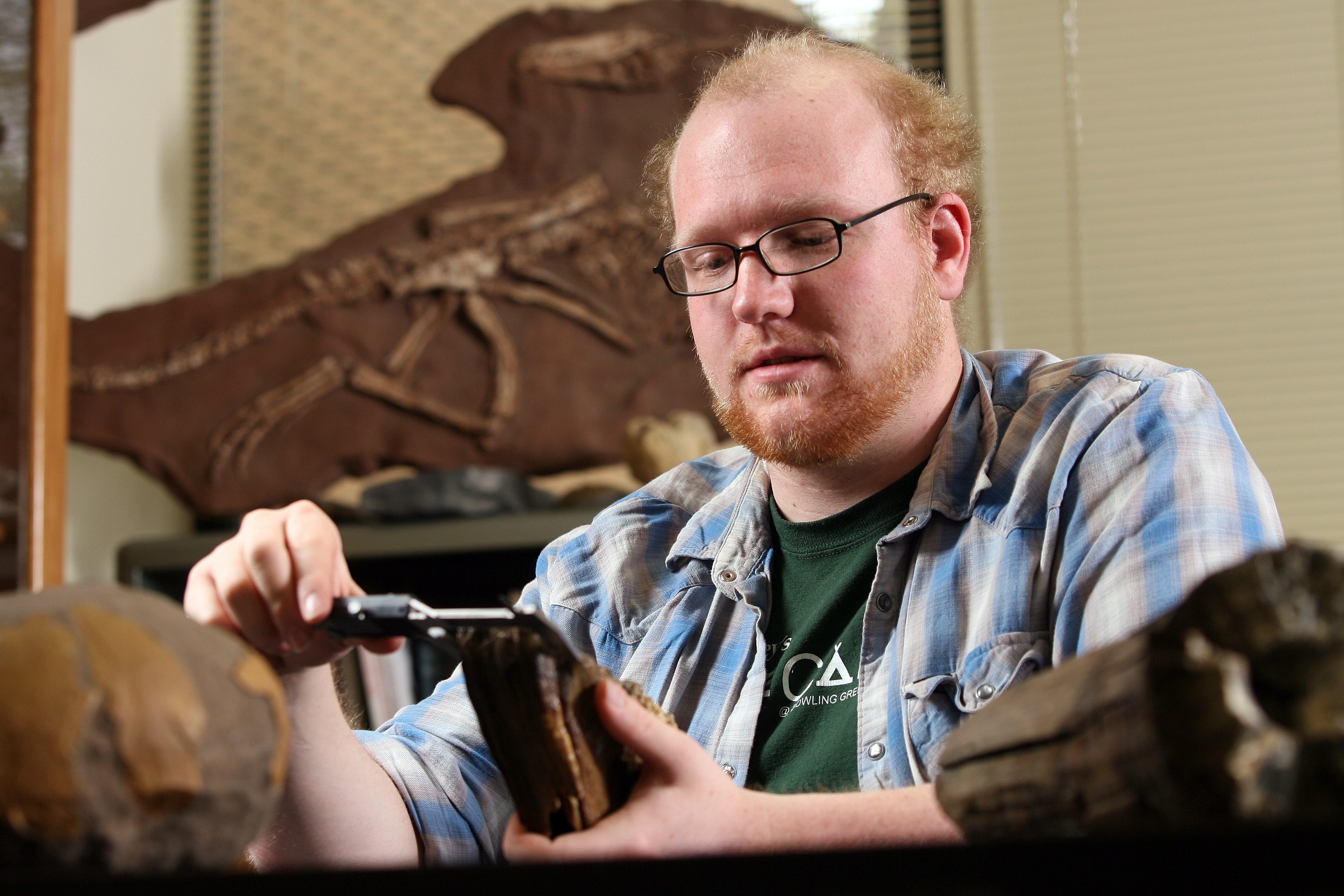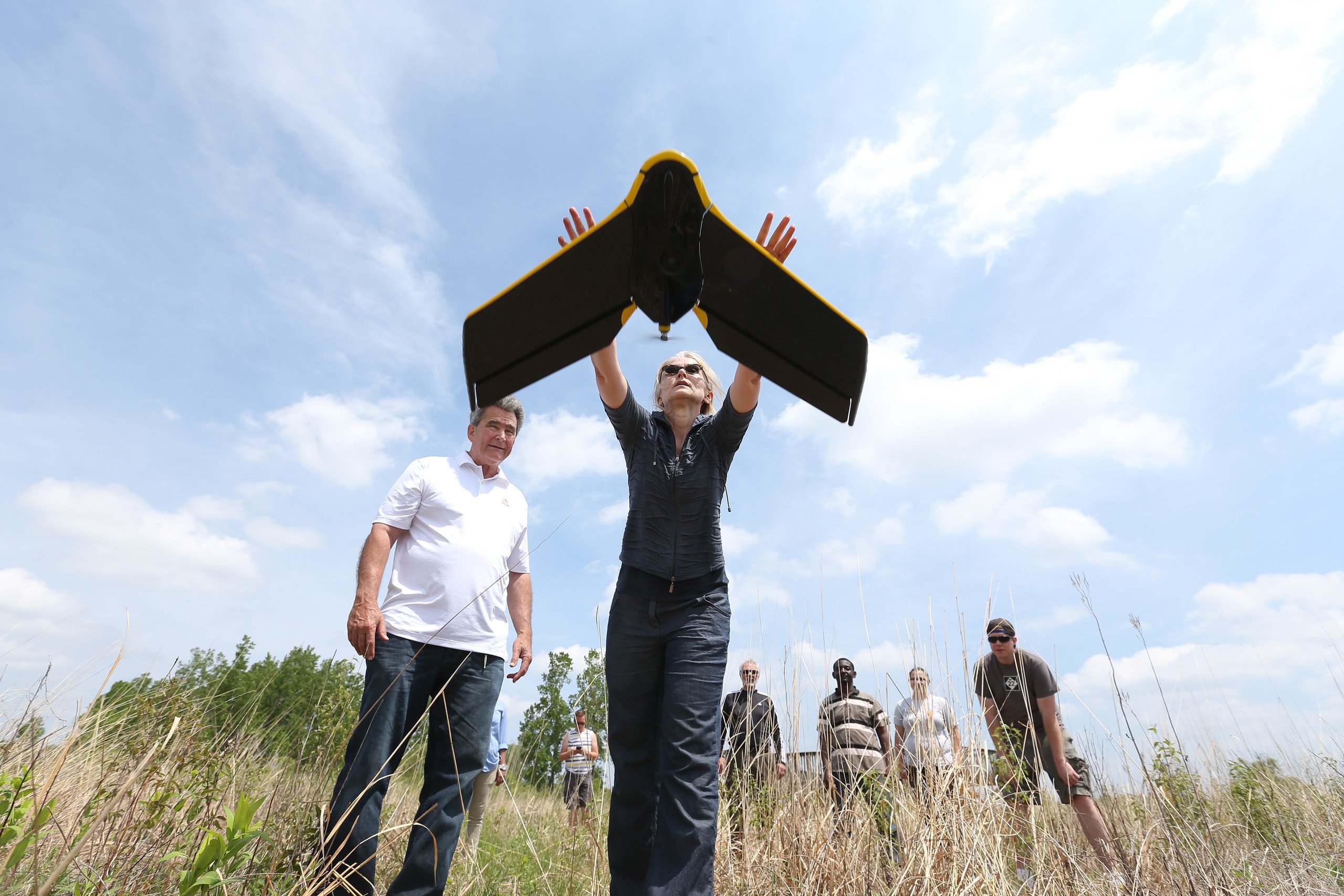Nationally recognized for student experience
The Wall Street Journal

Bachelor of Science (B.S.)
Geology: Paleobiology
A B.S. in geology with specialization in paleobiology from Bowling Green State University offers the opportunity to decode Earth’s biological history in order to rewrite a more sustainable future.
Paleobiology is a scientific discipline combining aspects of paleontology and biology to study ancient life forms through fossil records. While paleontology broadly focuses on prehistoric life, paleobiology takes a more specialized approach by applying biological principles to understand how extinct organisms lived, functioned and evolved with Earth’s complex systems.
A degree in paleobiology is for those eager to study some of life’s greatest mysteries – such as why mass extinctions happened, how life rebounded and what those patterns can teach us – so we can better navigate current problems like biodiversity loss, climate change and dwindling natural resources.
Our paleobiology degree program combines rigorous geological training with specialized biological knowledge to ensure graduates have a unique grasp of both earth and life sciences. At BGSU, you’ll:
- Learn and work alongside leading paleobiologist researchers in state-of-the-art laboratories
- Participate in career-defining field experiences
- Develop the multidisciplinary expertise that academic institutions and industry partners increasingly demand
Why study paleobiology at BGSU in Ohio?
- Real-world field experience. Students have opportunities to study fossils and other formations in their natural settings. That includes regional fieldwork in the Midwest, as well as required summer field course in the Basin Range, Colorado Plateau and Rocky Mountain regions.
- State-of-the-art paleontology lab. Our paleontology laboratory is one of more than half a dozen laboratories accessible to geology majors. It houses well over 120,000 fossil specimens for teaching and research, with a particular strength in Paleozoic marine invertebrates. Students have access to:
- Several stereomicroscopes (including one with dedicated digital camera and camera lucida)
- Mechanical and chemical preparation facilities
- Field collection equipment
- Small class sizes and expert faculty. Work closely with renowned paleobiologists, paleontologists and geologists active in research and industry collaborations.
- Internships and research opportunities. Get hands-on experience through a required research project and internships at museums, research institutions and environmental agencies.
- Strong industry and academic connections. Build a professional network that includes highly-regarded paleontologists, geologists and researchers in other disciplines across the country.
- Many minor degree options. The School of Earth, Environment and Society offers minors in:
- Environmental studies
- Environmental science
- Sustainability
- Water resources
- Applied geospatial science
- Geology
- Paleontology
- Connect on campus. The BGSU Geology Club hosts regular group discussions, movie and craft nights and field trips. There’s also an annual geology banquet and information on professional opportunities including internships, graduate schools and job openings.
Our internship program has a long and successful history. Many students are hired full time by their internship employers.
#1 public university in Ohio for career prep
The Wall Street Journal
Career - what can you do with a paleobiology degree?
The looming mass extinction crisis has significantly increased demand in the field of paleobiology. A paleobiologist’s expertise sits at the critical intersection of past extinction events and our current biodiversity crises.
A paleobiologist is uniquely qualified to provide answers to questions like:
- How do ecosystems collapse and potentially recover?
- Which traits make species more vulnerable or resilient to extinction?
- What are the cascading effects when keystone species disappear?
- What are the timescales of ecological recovery after major biodiversity losses?
This specialized geology degree from BGSU equips you with the knowledge and skills to pursue meaningful work in both the public and private sectors. You can bridge science, history and conservation.
Examples of career paths include:
- Paleontologist. Excavate and analyze fossils to understand Earth’s prehistoric life and evolutionary history.
- Paleontological resource manager. Document, protect, and manage access to fossil sites and educate the public about their importance.
- Environmental consultant. Use knowledge of ancient ecosystems to inform modern environmental preservation and restoration efforts.
- Graduate school and research. Pursue advanced degrees in paleontology, geology or evolutionary biology that lead to roles in academia and research.
Look for expanding opportunities in museums and research institutions, environmental agencies, energy companies, governmental agencies and nonprofit organizations.
Career paths
- Educator
- Environmental engineer
- Environmental field technician
- Geological engineer
- Geologist
- Geophysicist
- Land surveyor
- Museum curator
- Paleobiologist
- Petroleum geologist
- Sustainability consultant
Quick Facts from the Bureau of Labor Statistics
Curriculum
Paleobiology students are required to complete a minimum of 122 credit hours – 40 of those at the 3000/4000 level.
Students take 45-46 credit hours in the geology field in addition to 20-21 credit hours in their specialization. Courses include Life through Time, Geologic History of Dinosaurs, Vertebrate Paleontology, and Evolution.
Graduates with a B.S. in geology with a specialization in paleobiology are able to:
- Identify, describe and classify earth materials, formations and structures and interpret them in the context of geological processes.
- Analyze and report quantitative geologic data collected in the field and laboratory.
- Read, write, present and critically evaluate geologic reports, professional papers and maps.
- Synthesize information from a variety of disciplines to solve geologic problems.

Sample courses
- Earth Materials
- General Genetics
- Geospatial Science
- Independent Research in Geology
- Paleontology
- Population and Community Ecology
The BGSU Office of Campus Sustainability’s strategic plan outlines efforts to reduce, reuse, conserve and recycle – with the ultimate aim of carbon neutrality by 2040.
#1 university in Ohio – big or small, public or private – students would choose again
The Wall Street Journal
Field Course
Field research is fundamental for a future paleobiologist. The summer-long BGSU Field Course provides an unparalleled opportunity for students to:
- Hone skills in the field
- Foster lifelong connections
- Prepare for dynamic careers in paleobiology, paleontology, environmental consulting, academic, geoscience research and more
Paleobiology students learn to use the latest tools, technologies and techniques in the field in some of the most geologically significant regions of the U.S. They analyze Paleozoic and Mesozoic sedimentary strata, Precambrian metamorphic facies, Cenozoic volcanism and more from locations within the Basin and Range Province, Colorado Plateau and Rocky Mountains.
Field exercises offer real-world applications of classroom learning and include sedimentary section analysis, geologic mapping, structural fault assessments and environmental site evaluations.
Prepare for rigorous academic and physical challenges, including fieldwork at elevations of 11,000+ feet and six-day work weeks. There are also exciting extracurricular opportunities, such as mineral rock collecting, mountain climbing and white-water rafting. Housing arrangements include dorms, private lodges and camping sites.
Facilities, laboratories and equipment
If you want to become a paleobiologist, learning your way around the scientific tools, facilities and processes you’ll use in the field is key.
BGSU students in School of Earth, Environment and Science have access to state-of-the art laboratories and facilities in facilities spread across five buildings on campus. We offer top-of-the-line tools for use in hands-on learning and research in geophysical analysis, field hydrology, surveying and more.
Specialized laboratories include:
- Paleontology laboratory
- GeoInformatics Laboratory (GIL)
- G-ECO Remote Sensing Lab
- Geochemistry laboratory
- High temperature and pressure mineral synthesis laboratory
- Sedimentary processes laboratory
- Sediment core lab
- Rock preparation facilities
The geology program with a specialization in paleobiology is part of the School of Earth, Environment and Society in the BGSU College of Arts and Sciences.
Accreditation
Bowling Green State University [BGSU] is accredited by the Higher Learning Commission. BGSU has been accredited by the Higher Learning Commission since 01/01/1916. The most recent reaffirmation of accreditation was received in 2022-2023, with our next reaffirmation of accreditation scheduled for 2032-2033. Questions should be directed to the Office of Institutional Effectiveness.
Request Information
Updated: 05/06/2025 09:47AM

